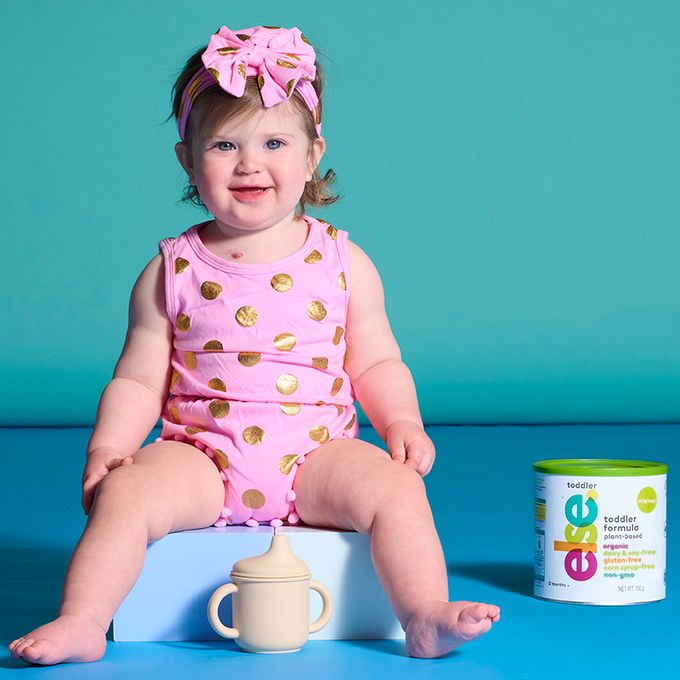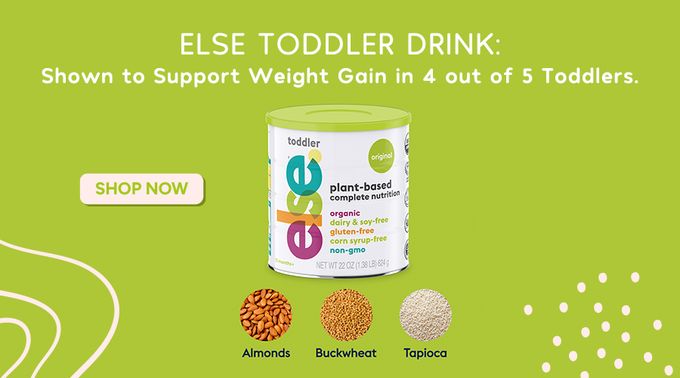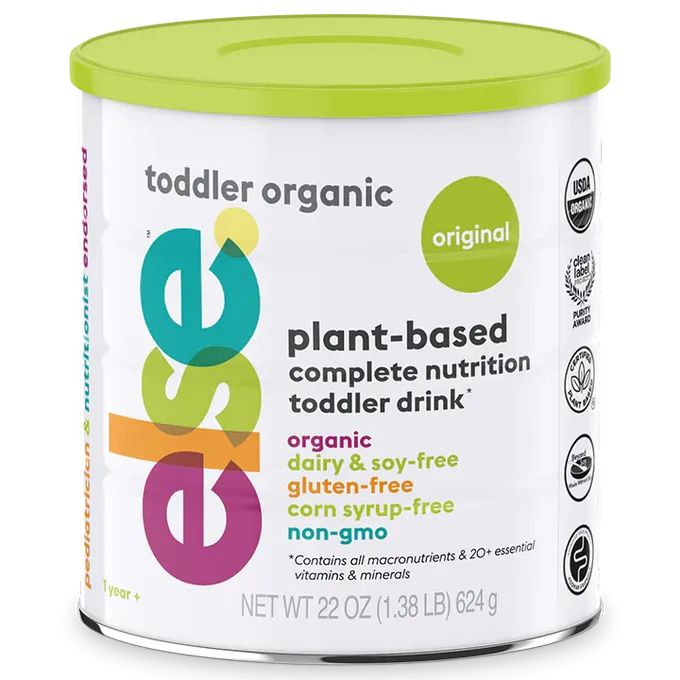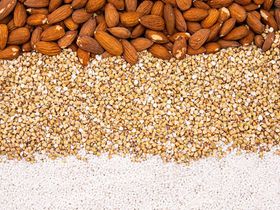Choosing the Best Soy Formula for Your Child + Real Alternatives to Soy
Updated June 11, 2024

Choosing a soy formula can be crucial for infants and toddlers with dairy allergies or sensitivities, including those with cow's milk allergy, and is also chosen by families following vegetarian diets.
However, alternatives to soy-based formulas have emerged in recent years, and we will examine them as well.
Designed to offer complete nutrition, soy formulas are a popular alternative to cow’s milk formula for infants with cow's milk allergy. This article provides a factual comparison of the leading soy formulas, helping you make an informed decision tailored to your infant’s specific needs.
Snapshot of Top Soy Protein Formulas
Best for Sensitive Systems: Enfamil’s ProSobee
Best for Gentle Nutrition: Gerber Good Start Gentle Soy Formula
Best for Brain and Eye Development: Similac Soy Formula
Best for Easy Digestion: Similac Soy Isomil
Best Soy-Free Alternative: for Toddlers: Else Nutrition’s Organic Toddler Formula
Enfamil's Plant-Powered Pitch
Soy based, lactose free formula as an alternative to cow’s milk based formula. Soy based formulas like Enfamil's ProSobee are chosen as an alternative for infants with sensitivities to cow's milk based formula.
Includes DHA for brain development
Suitable for babies with dairy sensitivities
Pros:
Tailored for babies with sensitive systems
Contains essential fatty acid for brain development
Vegetarian-friendly
Cons:
May not be suitable for all infants
Enfamil’s ProSobee stands out as a reliable soy-based formula for babies with sensitive systems. Specially designed to be lactose-free, it’s a blessing for babies with sensitivities to dairy. The inclusion of DHA, a crucial fatty acid for brain development, is a major plus. Combined with easy-to-digest proteins, this formula supports healthy growth while avoiding common dairy allergies.
Gerber's Gentle Goodness
Contains corn maltodextrin and various vegetable oils
Enriched with essential nutrients and vitamins
Pros:
Provides easy-to-digest proteins
Enriched with crucial nutrients
Suitable for infants with dairy sensitivities
Cons:
Some parents may prefer a simpler ingredient list
Gerber Good Start Gentle Soy formula is a gentle choice for babies with dairy sensitivities. The formula contains easily digestible proteins and essential nutrients, making it a comprehensive nutrition source. However, some parents may prefer a formula with a simpler ingredient list.
Rating:
Similac's Soy Solution
Specifications:
Contains DHA and lutein for brain and eye development
Prebiotics for digestive health
Free from palm olein oil
Pros:
Supports brain and eye development
Promotes digestive health
Enhanced calcium absorption
Cons:
Not suitable for premature infants weighing less than 1800 grams at birth
Similac Soy Formula is an excellent choice for families with specific dietary needs. The formula supports brain and eye development with DHA and lutein, while prebiotics promote digestive health. However, it’s important to note that this formula is not recommended for premature infants weighing less than 1800 grams at birth.
Similac Soy Isomil's Infant Innovation
Contains nucleotides for immune system development
Prebiotics for digestive health
Free from palm olein oil and coconut oil
Pros:
Eases digestion
Supports immune system development
Promotes enhanced calcium absorption
Cons:
Not suitable for all infants
Similac Soy Isomil is a specialized formula designed to ease digestion, making it an excellent choice for infants transitioning from milk-based formulas. The formula’s inclusion of nucleotides supports a healthy immune system, making it advantageous for a baby’s overall health. However, it’s important to note that it may not be suitable for all infants.
Rating:
Deciphering Soy Formulas
Soy formulas, such as those we’ve discussed, are packed with the following nutrients:
Around 40-41% soy protein derived from processed soybeans, providing essential amino acids similar to those found in animal foods. This protein content includes soy protein isolate.
Iron-fortified to prevent deficiencies, due to substances like phytic acid that inhibit iron absorption
Carbohydrate profile includes soluble sugars and insoluble fibers
Fats are supplemented from vegetable oils such as soy oil
These formulas also provide essential fatty acids and minerals like potassium, calcium, and magnesium, necessary for overall infant health and development. However, it’s worth noting that isoflavones found in soy formulas can bind to estrogen receptors, raising concerns about potential hormonal effects on the reproductive system, immune and thyroid function, and sexual development.
Despite these concerns, soy formulas can accommodate various diet-restricted conditions like galactosemia, lactose intolerance, and specific dietary guidelines such as vegetarian, Kosher, and Halal practices. For instance, Gerber Gentle Soy formula is specifically tailored for babies with sensitivities to dairy as it is free from cow milk proteins.
In the context of cow's milk allergy and intolerance, soy protein-based formulas serve as a significant alternative for infants previously fed cow's milk formulas. These soy-based options are particularly relevant for managing conditions like cow's milk protein allergy, offering a nutritional substitute that avoids the allergenic proteins found in cow's milk-based formulas. However, it's important to note that soy formulas tend to have a higher aluminum content compared to cow's milk formula, which could have implications for infant health and is a factor for caregivers to consider when choosing between soy and cow's milk-based options for their infants.
However, soy-based formulas, including Similac’s range, are not recommended for premature infants who weigh less than 1800 grams at birth due to specific nutritional needs. In essence, Soy infant formula products are intended for infants under 12 months of age, aligning with nutritional guidelines for this developmental stage.
When offering reduced-fat milk such as soy milk to toddlers, it’s important to ensure that the essential fats are supplemented through other dietary sources. Also, soy formulas are subject to strict FDA regulations, and some products may have additional certifications indicating purity from contaminants such as the Clean Label Project Purity certification.
Else Nutrition's Plant-Based Complete Nutrition for Toddlers - An Alternative to Soy Infant Formula for Toddler
Dairy-free, soy-free, and GMO-free
Contains essential omega-3 and omega-6 fatty acids
More than 20 vitamins and minerals
Pros:
Suitable for toddlers aged 12 to 36 months
Free from common allergens
Derived from real whole foods
Cons:
Check if your child has an almond allergy, as this formula contains almonds.
Else Nutrition’s Organic Toddler Formula offers a unique blend of nutrients suitable for toddlers aged 12 to 36 months. It’s completely free from:
dairy
soy
gluten
corn syrup
GMOs
This makes it a superior option compared to soy-based formulas. Over 80% of its components are derived from real whole foods, ensuring minimally processed, nutrient-rich nourishment. However, it’s important to note that it may not be suitable for all toddlers.
Tailoring to Your Little One's Needs
Choosing the right formula requires understanding your baby’s specific needs. Soy protein formulas are recommended for babies with:
allergies or intolerance to cow’s milk
galactosemia
severe persistent lactose intolerance
following post-infection diarrhea
who are on a vegan diet
Soy protein formulas, such as Gerber Gentle Soy formula, are specifically tailored for babies with cow’s milk allergy or sensitivities to dairy or breast milk. These formulas have seen significant improvements in digestibility, nutritional values, and protein quality, making them a recommended alternative for infants unable to tolerate cow's milk. However, it's important to be aware of the ongoing discussions about the potential drawbacks of soy-based formulas, including concerns about phytoestrogens and the use of genetically modified soybeans.
For instance, Gerber Gentle Soy formula is specifically tailored for babies with cow’s milk allergy or sensitivities to dairy or breast milk, as it is free from cow milk proteins and an alternative to cow’s milk formula, compared to fed cow’s milk formulas and cow’s milk based formulas.
Soy formulas like the one designed to avoid milk derivatives and are free from lactose, using soy lecithin to prevent milk-based allergen issues. However, soy-based formulas, including Similac’s range, are not recommended for premature infants who weigh less than 1800 grams at birth due to specific nutritional needs that a milk based formula might provide.
It’s worth noting that Soy infant formula products are intended for infants under 12 months of age, aligning with nutritional guidelines for this developmental stage. When offering reduced-fat milk such as soy milk to toddlers, it’s important to ensure that the essential fats are supplemented through other dietary sources.
In conclusion, while soy formulas can offer a viable alternative for infants with specific dietary needs, it’s essential to ensure the soy based infant formula is tailored to your baby’s needs. Always consult a healthcare professional before switching formulas to ensure your baby gets the right nutrition.
Budgeting for Baby's Diet
Budgeting for your baby diet can be a balancing act between providing the best nutrition and managing costs. One way of achieving this balance is by opting for generic soy formulas, which are often nutritionally comparable to brand-name ones and can provide significant cost savings as they are required to meet the same FDA standards.
Another cost-saving strategy is to opt for powdered soy formulas, which can result in more savings compared to choosing liquid concentrate or ready-to-feed forms. However, convenience and preparation time may factor into this decision.
Purchasing soy formula in bulk can provide better value, but it’s essential to ensure your baby’s tolerance of the formula before making a large purchase to prevent waste. Also, always check the expiration dates when buying in bulk to avoid wastage.
For eligible families, programs like the Women, Infants, and Children (WIC) can assist with the expenses associated with buying baby formula. Each state has its own WIC program, with different eligibility requirements and benefits. It’s worth checking out if you qualify for assistance.
In conclusion, while the cost of baby formula can add up, there are ways to manage these expenses without compromising on your baby’s nutrition. Always consult with a healthcare professional or a dietitian to ensure your baby’s dietary needs are met within your budget.
Summary
In summary, soy formulas offer an excellent alternative for infants with specific dietary needs, providing lactose-free, vegetarian-friendly options packed with essential nutrients for infant health and development. Brands like Enfamil, Gerber, and Similac provide a range of soy formulas designed to cater to these needs, each with their unique features and benefits.
However, it’s important to consider potential concerns about isoflavones in soy formulas and ensure the formula is tailored to your baby’s specific needs. Soy formulas are recommended for babies with specific dietary conditions but are not suitable for all infants.
Budgeting for your baby’s diet can involve choosing generic formulas, opting for powdered forms, purchasing in bulk, and exploring assistance programs like WIC. However, regardless of the cost, the most important factor is ensuring that your baby’s nutritional needs are met.
In conclusion, choosing the right toddler formula is a crucial decision with long-term implications for your baby’s health and development. Having a clear understanding of the options available, their pros and cons, and how to tailor them to your baby’s needs can help you make an informed decision.
Frequently Asked Questions
Are soy formulas safe for my baby?
Soy formulas are safe for most healthy full-term infants, but it's important to consult a healthcare professional before making any changes, especially for premature babies or those with specific medical conditions.
When should I consider a soy formula for my baby?
You should consider a soy formula for your baby if they have allergies or intolerance to cow's milk, galactosemia, severe persistent lactose intolerance, post-infection diarrhea, or if they are on a vegan diet. It's important to consult with a pediatrician before making this decision.
Are generic soy formulas as good as brand-name ones?
Yes, generic soy formulas are required to meet the same FDA standards as brand-name formulas and are often nutritionally comparable, providing significant cost savings.
What should I consider when budgeting for my baby's diet?
When budgeting for your baby's diet, focus on meeting their nutritional needs first. Consider options like generic formulas, bulk purchases, and assistance programs like WIC to help manage costs.
Can I give my toddler soy milk instead of cow's milk?
Yes, you can give your toddler soy milk, but make sure to supplement essential fats through other dietary sources. You can also try our Else Plant Based Complete Nutrition Drink for Toddlers, which contains no dairy or soy.
The content and advice provided in this article is for informational purposes only and is not a substitute for medical diagnosis, treatment, advice for specific medical conditions. Always consult a pediatrician to understand the individual needs of your child. The article expresses the views of the brand editor.











